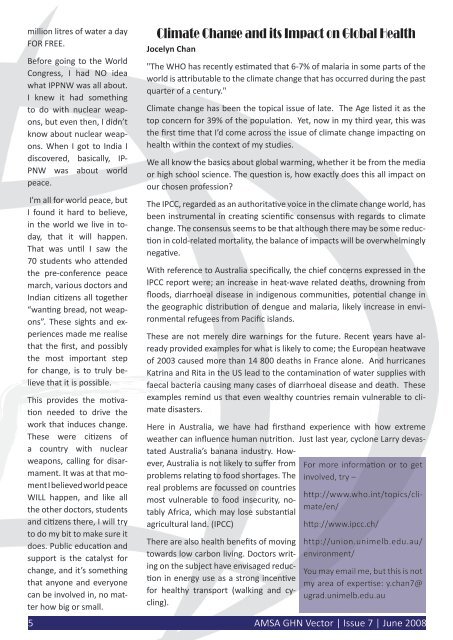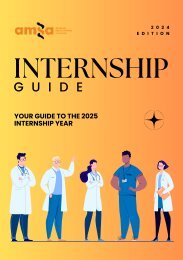Create successful ePaper yourself
Turn your PDF publications into a flip-book with our unique Google optimized e-Paper software.
million litres of water a day<br />
FOR FREE.<br />
Before going to the World<br />
Congress, I had NO idea<br />
what IPPNW was all about.<br />
I knew it had something<br />
to do with nuclear weapons,<br />
but even then, I didn’t<br />
know about nuclear weapons.<br />
When I got to India I<br />
discovered, basically, IP-<br />
PNW was about world<br />
peace.<br />
I’m all for world peace, but<br />
I found it hard to believe,<br />
in the world we live in today,<br />
that it will happen.<br />
That was until I saw the<br />
70 students who attended<br />
the pre-conference peace<br />
march, various doctors and<br />
Indian citizens all together<br />
“wanting bread, not weapons”.<br />
These sights and experiences<br />
made me realise<br />
that the first, and possibly<br />
the most important step<br />
for change, is to truly believe<br />
that it is possible.<br />
This provides the motivation<br />
needed to drive the<br />
work that induces change.<br />
These were citizens of<br />
a country with nuclear<br />
weapons, calling for disarmament.<br />
It was at that moment<br />
I believed world peace<br />
WILL happen, and like all<br />
the other doctors, students<br />
and citizens there, I will try<br />
to do my bit to make sure it<br />
does. Public education and<br />
support is the catalyst for<br />
change, and it’s something<br />
that anyone and everyone<br />
can be involved in, no matter<br />
how big or small.<br />
Climate Change and its Impact on Global Health<br />
Jocelyn Chan<br />
"The WHO has recently estimated that 6-7% of malaria in some parts of the<br />
world is attributable to the climate change that has occurred during the past<br />
quarter of a century."<br />
Climate change has been the topical issue of late. The Age listed it as the<br />
top concern for 39% of the population. Yet, now in my third year, this was<br />
the first time that I’d come across the issue of climate change impacting on<br />
health within the context of my studies.<br />
We all know the basics about global warming, whether it be from the media<br />
or high school science. The question is, how exactly does this all impact on<br />
our chosen profession?<br />
The IPCC, regarded as an authoritative voice in the climate change world, has<br />
been instrumental in creating scientific consensus with regards to climate<br />
change. The consensus seems to be that although there may be some reduction<br />
in cold-related mortality, the balance of impacts will be overwhelmingly<br />
negative.<br />
With reference to Australia specifically, the chief concerns expressed in the<br />
IPCC report were; an increase in heat-wave related deaths, drowning from<br />
floods, diarrhoeal disease in indigenous communities, potential change in<br />
the geographic distribution of dengue and malaria, likely increase in environmental<br />
refugees from Pacific islands.<br />
These are not merely dire warnings for the future. Recent years have already<br />
provided examples for what is likely to come; the European heatwave<br />
of 2003 caused more than 14 800 deaths in France alone. And hurricanes<br />
Katrina and Rita in the US lead to the contamination of water supplies with<br />
faecal bacteria causing many cases of diarrhoeal disease and death. These<br />
examples remind us that even wealthy countries remain vulnerable to climate<br />
disasters.<br />
Here in Australia, we have had firsthand experience with how extreme<br />
weather can influence human nutrition. Just last year, cyclone Larry devastated<br />
Australia’s banana industry. However,<br />
Australia is not likely to suffer from<br />
problems relating to food shortages. The<br />
real problems are focussed on countries<br />
most vulnerable to food insecurity, notably<br />
Africa, which may lose substantial<br />
agricultural land. (IPCC)<br />
For more information or to get<br />
involved, try –<br />
There are also health benefits of moving<br />
towards low carbon living. Doctors writing<br />
on the subject have envisaged reduction<br />
in energy use as a strong incentive<br />
for healthy transport (walking and cycling).<br />
http://www.who.int/topics/climate/en/<br />
http://www.ipcc.ch/<br />
http://union.unimelb.edu.au/<br />
environment/<br />
You may email me, but this is not<br />
my area of expertise: y.chan7@<br />
ugrad.unimelb.edu.au<br />
5 AMSA GHN <strong>Vector</strong> | <strong>Issue</strong> 7 | June <strong>2008</strong>

















